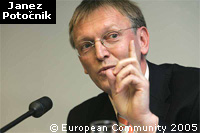Potocnik welcomes budget agreement, but questions underlying logic
Science and Research Commissioner Janez Potocnik has welcomed the fact that Member States were able to reach agreement on the EU budget for 2007 to 2013, saying that the cost of not having reached an agreement 'would have been enormous'. During a speech in Germany on 19 December, Commissioner Potocnik congratulated the UK Presidency for its role in reaching the agreement, and also praised the work of the new German Chancellor Angela Merkel in brokering a deal. Given the constraints of the final budget allocation, research had received its fair share, he said. 'Clearly, this agreement is not everything we wanted,' Mr Potocnik admitted. 'But the Commission has worked actively to help the Member States strike the best deal possible in the circumstances. The deal agreed unanimously by the leaders of the 25 Member States reflects the political reality.' However, the underlying problem exposed by the negotiations is that the Member States essentially see the EU budget as a financial mechanism of redistribution, he continued, and such an approach will always result in a budget where the size and structure are less than ideal. 'The essential question is whether we are ready and capable of going beyond the redistribution logic so that we can define a budget that better responds to the challenge of today's world,' said the Commissioner. 'Whatever a more detailed analysis of what happened [at the Council summit] will show, I think far too long political leaders in Europe have allowed the debate to turn around net flows.' Mr Potocnik hopes that the focus of the debate will have changed in time for the comprehensive review of the financial perspectives in 2008/2009, which was a condition of the recent agreement. His dream, he said, would be to launch a new European project focused on knowledge, on a par with the environmental movement of the 1970s or the internal market project of the 1990s. In the meantime, however, Commissioner Potocnik would like to see the Seventh Framework Programme (FP7) launched at the very start of the German Presidency in 2007. 'This means a lot of work next year: the Rules for participation and dissemination will be tabled shortly and we need to continue to make progress in Council and the European Parliament on all the legislative proposals. It is extremely important that we keep up momentum,' he concluded.



